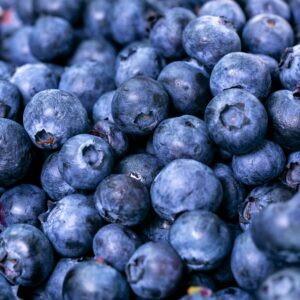By Vishakha Mahajan, PhD
The role of diet and nutrition as an effective management strategy for various conditions has been extensively highlighted. Growing body of research has demonstrated the significant influence specific foods have on our health and well-being. Popularly, following the Mediterranean Diet, rich in vegetables, fruit, whole grains, heart-healthy fats, and fish while limiting alcohol, processed foods, and added sugars has been associated with slowing cognitive decline (1). Moreover it may also play a role in preventing the build-up of amyloid plaques, a hallmark of Alzheimer’s disease (2).
 The brain, often called the body’s control center, is key to signaling, planning, and coordinating many important functions. It allows us to retain memories with our loved ones, act with reason and it houses the emotions that make us who we are. To support these vital tasks, the brain needs proper nourishment. To help you fuel your brain, we have put together a list of five superfoods that contain brain-boosting properties:
The brain, often called the body’s control center, is key to signaling, planning, and coordinating many important functions. It allows us to retain memories with our loved ones, act with reason and it houses the emotions that make us who we are. To support these vital tasks, the brain needs proper nourishment. To help you fuel your brain, we have put together a list of five superfoods that contain brain-boosting properties:
Blueberries:
Blueberries are rich in anthocyanins, the natural pigment that give them their vibrant blue hue. Blueberries are known for their powerful antioxidant properties that help protect against oxidative stress, which has been linked with brain aging and cognitive decline. Performing day-to-day tasks, our cells produce free radicals, unstable molecules that can cause oxidative stress and damage cells if left unchecked. Antioxidants help neutralize these free radicles protecting our cellular health. Studies show that blueberries can help support cognitive performance, memory and protect against neuro-decline (3).
Broccoli:
Broccoli is a great source of vitamin K, a fat-soluble nutrient essential for synthesizing sphingolipids – a key component of brain cell membranes involved in learning and memory. low vitamin K levels have been associated with cognitive decline (4). Additionally Broccoli also contains sulforaphane, a compound that activates the Nrf2 pathway, helping detoxify the body and boost antioxidant defenses, which may protect against neurodegenerative diseases (5).
 Turmeric:
Turmeric:
Turmeric is a native Indian spice that contains curcumin, an active ingredient known for its potent anti-inflammatory properties. A growing number of studies have indicated benefits of curcumin on mood, particularly in depression and anxiety. Since increased inflammatory factors have been associated with depression, the ability of curcumin to inhibit these inflammatory markers, highlight is positive effects on mood (6).
Eggs:
In addition to being a source of high-quality protein, eggs are rich in choline, a nutrient that is essential to produce acetylcholine. Acetylcholine (7) is a neurotransmitter that plays a key role in communication between brain cells and regulating memory and learning. Further, eggs are considered a complete protein, providing all 9 essential amino acids necessary for various biological functions and health, making them a great addition to your diet.
Walnuts:
Walnuts contain alpha-linolenic acid (ALA), a type of omega-3 fatty acid known for its anti-inflammatory properties. Several studies exploring the impact of dietary intake of walnuts have reported improved cognitive function (8). Additionally, their ability to reduce oxidative stress and offer neuroprotective benefits has been linked to the slowed progression of age-related cognitive decline.
Taking care of your brain through proper nutrition is one of the most powerful steps you can take to support your memory and overall well-being. By including these brain-boosting superfoods in your diet, you are actively investing in your cognitive health—no matter your age.
Small changes today can lead to lasting benefits, helping you stay sharp, focused, and energized for years to come. Your brain is your greatest asset—nourish it, protect it, and make every meal an opportunity to thrive.
About the Author:
Vishakha Mahajan (PhD.) is a New Zealand based Health Scientist with over 7 years of experience in research and writing across diverse fields, including women’s health, cancer and brain health. Her recent work in the wellness and functional food industry, has deepened her interest in understanding the relationship between lifestyle, nutrition and health. Vishakha is passionate about bridging health-related knowledge gaps and is committed to making science-backed information relatable and accessible, focusing on how everyday choices influence well-being.
- https://www.healthline.com/nutrition/mediterranean-diet-meal-plan
- Agarwal, Puja et al. “Association of Mediterranean-DASH Intervention for Neurodegenerative Delay and Mediterranean Diets With Alzheimer Disease Pathology.” Neurology 100,22 (2023): e2259-e2268. doi:10.1212/WNL.0000000000207176
- Kalt W, Cassidy A, Howard LR, Krikorian R, Stull AJ, Tremblay F, et al. Recent Research on the Health Benefits of Blueberries and Their Anthocyanins. Advances in Nutrition. 2020 Mar;11(2):224–36.
- Alisi, Ludovico et al. “The Relationships Between Vitamin K and Cognition: A Review of Current Evidence.” Frontiers in neurology vol. 10 239. 19 Mar. 2019, doi:10.3389/fneur.2019.00239
- Sun, Y et al. “Sulforaphane Protects against Brain Diseases: Roles of Cytoprotective Enzymes.” Austin journal of cerebrovascular disease & stroke vol. 4,1 (2017): 1054. doi:10.26420/austinjcerebrovascdisstroke.2017.1054
- Ramaholimihaso, Tahiana et al. “Curcumin in Depression: Potential Mechanisms of Action and Current Evidence-A Narrative Review.” Frontiers in psychiatry 11 572533. 27 Nov. 2020, doi:10.3389/fpsyt.2020.572533
- Picciotto, Marina R et al. “Acetylcholine as a neuromodulator: cholinergic signaling shapes nervous system function and behavior.” Neuron 76,1 (2012): 116-29. doi:10.1016/j.neuron.2012.08.036
- Chauhan, Abha, and Ved Chauhan. “Beneficial Effects of Walnuts on Cognition and Brain Health.” Nutrients 12,2 550. 20 Feb. 2020, doi:10.3390/nu12020550






